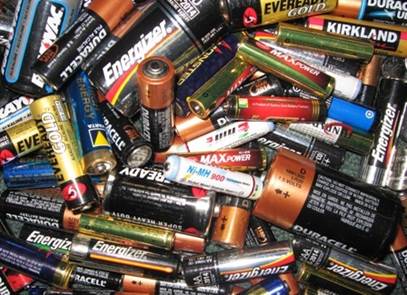
Battery (household)

All batteries contain substances which are harmful if swallowed.
Batteries are made from a number of different materials including acid, lead, nickel, lithium, cadmium, alkaline, mercury and nickel metal hydride. When batteries are not properly disposed of the casing can disintegrate and toxic chemicals can leach into the surrounding environment.
A, AA, AAA, C, D, 6V, 9V, Alkaline/carbon based, Nickel-cadmium (Ni-Cd), button batteries (found in hearing aids, watches, calculators)
There are two general types of batteries - primary (disposable) and secondary (rechargeable). Primary batteries are designed to be used once and discarded when they are exhausted. Secondary batteries are designed to be recharged and used multiple times.
Here's how battery recycling works and why you should be doing it!
Auckland-based E-Cycle sends full shipping containers - around 20 ton of batteries - to Australia for dismantling and then on to South Korea where the mercury, cadmium, lead and other heavy metals are extracted and recycled. Fully 98% of a battery's components can be recycled!
Interwaste takes all types of batteries, though rechargeables and lithium ion ones are the only ones actually recycled. Non-rechargeable batteries are encased in cement and sent to landfill.
Read more in this article: How green are home batteries?
Invest in a battery recharging unit and always choose to buy rechargeable batteries.
Before you purchase an electrical device, research what type of batteries it takes and whether they are recyclable. Rechargeable batteries can be purchased for use in most appliances i.e. digital cameras, torches, remote controls etc. Also check if there is an option to purchase a device with USB-charging capability instead of disposable batteries.
Solar powered technology is advancing and solar powered products are becoming more widely available i.e. solar powered backpack that charges your mobile phone, laptop and other devices is already available.
Help the environment by using only rechargeable batteries, as non-rechargeable batteries are not able to be reused.
The Whanganui Resource Recovery Centre has an household battery disposal bin. Ask a staff member.
- AA, AAA, C, D, 9V, 6V
- Power tool batteries
- Button cell batteries
- Other handheld-sized batteries that fit into the collection unit slot
Gel batteries (e.g. from Whanganui District Health Board Loans Department equipment) can go to Grumpy Old Men Enterprises at 28 Hinau Street. Contact via Gome Trust Facebook page, or Jim on 027 444 7474.
See cellphone for recycling these batteries.
See car battery
Please dispose of batteries conscientiously.